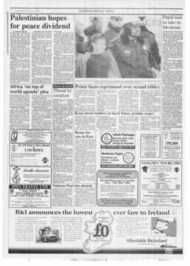Page 2, 7th February 1992
Page 2

Report an error
Noticed an error on this page?If you've noticed an error in this article please click here to report it.
Tags
Share
Related articles
'israel Needs To Offer Some Concessions'
Arab Patriarch Warns Of Holy Land Ghost Towns
Middle East
Pope John Paul Has Met With The Palestinian Leader To
Delicate Steps In The Middle East
Palestinian hopes for peace dividend
by Timothy Elphick
Palestinian leaders are hoping for a post-Cold War "peace dividend" when they meet with Israeli negotiators for the third stage of the Middle East conference later this month, the head of the Palestinian delegation at the talks told a gathering at the Catholic University of Notre Dame in Indiana this week.
Haidar Abdel Shafi told a meeting at the American church university that the end of confrontational super-power politics meant that the United States no longer had an interest in supporting "an aggressor" in the Middle Fast.
"With the end of the Cold War era and the collapse of the Soviet Union there is now in our estimation no valid reason for the United States to support and aggressor in our region," Mr Shaft said.
But the "only positive result" of the peace conference to have emerged so far was that the Palestinians had "started sitting at the table with the Israelis" now that procedural difficulties which had hampered the early stages of the peace process had been resolved, he said. Palestinians were still seeking the return of all the territories occupied by Israel at the end of the Seven Day War in 1967, Mr Shafi told his Catholic university audience.
"We cannot see how we can accept anything less than the West Bank, the Gaza Strip and occupied East Jerusalem," as territory for the foundation of an Palestinian state, he said.
But despite the progress made in being seen to negotiate on equal terms with the Israelis within a conference forum sponsored by the international community, Mr Shafi said that "the biggest single obstacle to peace is the intransigence of the Knesset" in continuing to claim all the Palestinian lands over which it currently exercised control.
The Palestinian negotiating team this week revealed that the next leg of the peace conference, which had been scheduled to restart on Monday, would begin either next week or the week after.
The delay was blamed on the absence of the US Secretary of State, James Baker, who will be outside the United States for the next few days.
Mr Shafi stressed that the Palestinian delegation still believed the Arab-Israeli conflict could be resolved "by peaceful means". Palestinians were "trying to modify their resistance to a form of non-violence", he said.
Shafi, a medical practitioner who has lived in the United States, delivered his lecture at Notre Dame on "Prospects for Peace in the Middle East" at the invitation of an Israeli civil rights campaigner, a visiting scholar at the university.
He was a member of the first executive committee of the Palestinian Liberation Organisation, and clashed with the Israeli authorities over the founding and operation of the Red Crescent Society in the region in the late 1960s. After being deported to Lebanon in 1970 he was given leave to return after protests by the Red Cross, the Red Crescent's sister organisation.
Palestinian representatives said this week that their absence from multilateral talks on the Middle East in Moscow last week was intended to show their defiance of Israeli negotiating conditions on the disputed territories.
blog comments powered by Disqus











